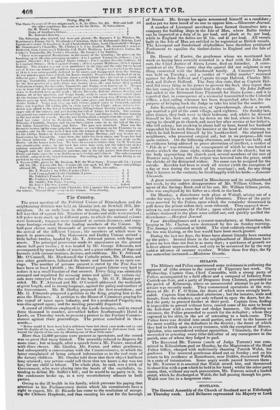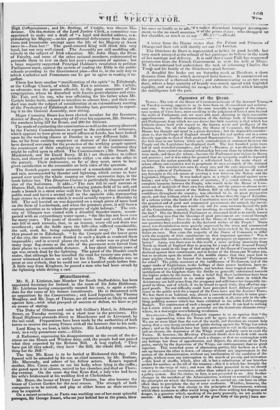SCOTLAND.
The General Assembly of the Church of Scotland met at Edinburgh on Thursday week. Lord Belhaven represented his Majesty as Lora High Co-nimissioner; and Dr. Stirling, of Craigie, was chosen Mo- derator. On the-motion of the Lord Justice Clerk, a committee was appointed to make out a draft of "a loyal and dutiful address, ccn- ?garatulating his Majesty—on his providential deliverance from the atro- tious and treasonable attempt upon the life of his Majesty at Ascot races in—June last !" The good-natured King will think this very loyal, but not very well-timed. The Assembly are still meddling offi- ciously in the subject of Irish education. Mr. John Hope, the Dean or Faculty, and some of the other rational members, endeavoured to persuade them to rest on their last year's expression of opinion ; but a large majority supported Principal Haldane's resolution to petition Parliament anew, against the system of reading the Bible in the public schools according to the Government plan—that is, in the only way in sghich Catholics and Protestants can be got to agree in reading it to- :get'ner.
There has been another "manifestation of the spirit" in Edinburgh, at the 'College Church, of which Mr. Tait is minister. Mr. Carlyle, an advocate, was the person affected, to the great annoyance of the .congregation, whom he disturbed with frantic gesticulations and cries. Mr. Tait, and his son, who was officiating for his father when Mr. Carlyle broke forth, refused to interfere to silence him ; and their con- - duct was made the subject of consideration at an extraordinary meeting of the Presbytery of Edinburgh on Saturday last, previously to report- ing it to the General Assembly, now sitting.
Major Cumming Bruce has been elected member for the Inverness district of Burghs, by a majority of 67 over his opponent, Mr. Stewart ; the numbers being 357 for Bruce, and 290 for Stewart.
The mode of conducting the examination as well as the secrecy observed by the Factory Commissioners in regard to the evidence of witnesses,
• which appears to have given so much offence at Leeds has been looked 'upon by the working classes at Dundee in a very different light. It has, so far from exciting suspicion or distrust of the Commissioners, been deemed necessary for the protection of the working people against the resentment of their employers on account of the testimony they might be called upon to afford. The Commissioners (Mr. Stuart, Mr. Mackintosh, and Sir David Barry, M.D.) set themselves to collect facts, and showed no partiality towards either Gne side or the other in the pursuit. Their endeavours, so far as' they went, seem to have given satisfaction to the reasonable on both sides of the question. The Scotch papers contain accounts of a remarkable storm of hail and rain, accompanied by thunder and lightning, which seems to have passed over nearly the whole country on three successive days, in the week before last. The Dumfries Courier is particularly eloquent on the size of the -hailstones. It adds—" The rain fell in such torrents at Hutton Hall, that it actually bared a sloping potato-field of its soil, and made a breach in a stout stone wall five feet high ; it then crossed the public road and burst a second wall on the opposite side, transporting huge stones to a distance which it would actually require a Hercules to lift. The soil hurried on was deposited on a rough piece of moss land on the farm of Locherbank, and when the potatoes grow, it will form a curious question as to whom the property of right belongs." The vici- nity of Glasgow was visited with a dreadful thunder-storm, accom- panied with an extraordinary water-spout ; "the like has not been seen for•many years. The peals of thunder were loud and awful, and the rain fell in such torrents, that, in an instant, every rill and drain was overflowed; and the fields upon the bill-sides suffered considerably, the soil, seed, &c. being completely washed away." The storm then passed on to Edinburgh. "In the Cowgate and the lower parts of the city, the streets were flooded to such a depth as rendered them impassable; and in several places the rush of water was so great that many large flag-stones at the side of the pavement were forced from their places to a considerable distance. A boy about thirteen years of age was struck dead by the lightning. The guard of the Dundee coach states, that although he has travelled the road for twenty-one years, he never witnessed a storm so awful in his life. The darkness was so great at one o'clock, that he could not see a hundred yards before him. A little way from Kingliorn, he passed a man who had been struck by the lightning while driving a cart.

















 Previous page
Previous page